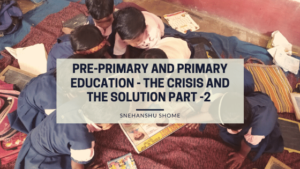Developing nations like India have multiple problems to solve in their society, and providing access to quality education to millions of children is one of these problems. Solving this enormous challenge is not the work of a single individual or an organization; that’s why there are multiple platforms on the front foot to solve this problem.
Currently, India is the edtech capital of the world. Indian edtech firms are leading the world market, which is an excellent thing for us and our economy but is it really solving the learning problem of a kid who is living in a low-resource setting environment?
India has over 26 crores of school-going students out of which 9.5 crore students are enrolled in private schools(UDISE+, Ministry of Education India – Government of India, 2021). Everyone would assume that all private school students can afford edtech solutions but one would be surprised to know that nearly 50% of private school students pay less than Rs 500 school fees per month and nearly 30% of private school students pay Rs 500-1000 per month as school fees(Ministry of Statistics and Programme Implementation, Government of India).
So to assume that the paid edtech solutions being offered by leading market players are actually catering to all school students would be wrong, as unfortunately it is out of reach of the majority of Indian population. Independent estimates point out that there are nearly 75% of Indian students are only dependent on their schools or their local educators for getting access to quality education.
It is a societal assumption that children in higher grades need support, and so all the stakeholders(government, private, etc.), including parents, provide children enrolled in higher grades with various edtech solutions.
But what about the children in pre-primary and primary grades?
5 crore Indian children don’t have foundational skills(National Education Policy, 2020), which is nearly 50% of total students enrolled in primary schools. Several reports have also highlighted shocking statistics about the state of children’s learning in their early years. In rural India, for example, 72% of grade 5 students cannot solve simple division problems (ASER, 2020).
Even if a majority of Indian children access ed-tech solutions in higher grades(which is highly unlikely), how effective is it if they skip basic education in early grades? They will be unable to understand complex concepts if they don’t have a strong foundation. We need to support the children neither by introducing a new system nor by providing high-priced products, but by implementing solutions within the existing contexts.
The question is, how can we help these students who are only dependent on local schools or community educators? In order to find an answer, we must understand the educational scenario in a low-resource environment. There are primarily four stakeholders involved:
- Children
- Parents
- School Teachers
- Local Educators
We cannot directly reach out to all children in early grades at scale with different ed-tech solutions due to lack of digital devices in their hands and operational constraints. Families who do have smartphones don’t always share the same with kids.
Considering that most parents work inside and outside their homes, we need to find a way of utlizing accessible technology solutions at scale so that they can be up-skilled in their free time. In such a way, we can empower parents to support their children’s learning.
School teachers are selected by the government with a pre-defined criteria and are generally considered skilled for teaching children. The government also works a lot on continuously up-skilling them using technology via a centralized approach but there is always room for improvement. So apart from the aforementioned approach, we also need to look at localised ed-tech solutions for empowering school teachers in a manner that would improve their skills and won’t feel like a burden for them.
The last and often the most ignored stakeholders are community teachers. They are never considered a part of the education system in most cases. Parents often tend to reach out to them to support their children’s education. One would be surprised to know that nearly 40% of children in rural India are supported by community educators, and this number rises to nearly 65% considering the averages of states like Odisha, Jharkhand, Bihar, and West Bengal (ASER, 2021).
Unlike tuition teachers in rich and upper-middle class societies who charge a bomb, most of the community educators in these low-resource settings teach children as a voluntary activity or are paid a meager amount by parents as fees. These community educators are semi-skilled, so the challenge at scale is to upskill them so that they effectively teach children. Cost-effective ed-tech solutions can be considered to support these humongous cadre of community teachers.
We have a strong belief that children in their early years can develop appropriate foundational skills by implementing all of the above solutions within the existing system. Multiple organizations can come up with different solutions for each of these remaining three stakeholder’s problems. Here are some of the solutions ThinkZone has implemented:
- We support parents through low-tech solutions like IVRS,SMS, voice calls and WhatsApp wherein they are empowered to support their children’s learning. They don’t need to go anywhere and are up-skilled in their leisure hours.
- We empower community educators via a specialized fellowship program where we support them on pedagogy, 21st-century skills, and communications skills using blended learning methods.
Our team understands these are the not the only ways of solving the problem of providing access to quality learning opportunities to children from low-resource environments. But the above solutions have worked well, with independent research finding significant learning gains among children who have been supported via our solutions.
We need more social enterprises in the ed-tech sector to solve the ‘learning issues’ faced by children present in ‘real India’. ThinkZone would like to collaborate to solve this pressing issue. Please email us at info@thinkzone.in for collaboration. We would also love to hear your thoughts about better ways to solve this challenge.


